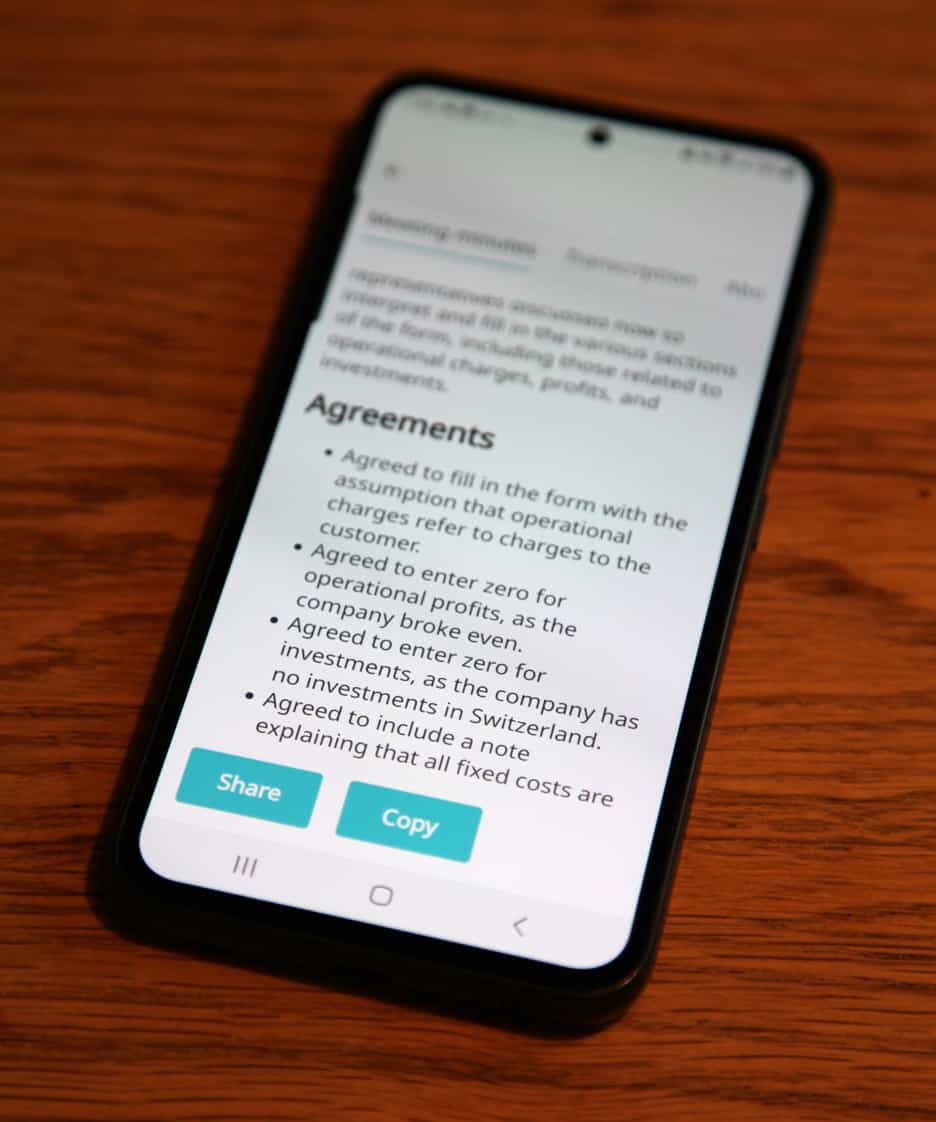The Importance of Taking Meeting Minutes for Productive Meetings
Are you often trapped in meetings that appear to gobble up your valuable time with negligible outcomes? Are you uncertain of the true importance of Meeting Minutes?
As a long-standing entrepreneur, I’ve sat in numerous meetings and I’ve seen the true value of taking meeting minutes. It’s an essential tool to effectively encapsulate and chronicle the discussion and results.
Research studies, including one by Harvard Business Review, reveal that executives burn nearly 23 hours a week in meetings. Majority of this time often goes to waste due to poor conduct and inefficiency.
Here in this article, you’ll uncover the key reasons why taking minutes at meetings is necessary, and how it can significantly boost the productivity of your meetings.
Understanding Meeting Minutes
Meeting minutes are short, concise records of important points discussed and actions decided upon in a professional meeting.
Meeting minutes aren’t the full script of a meeting. They highlight the important parts. They usually contain:
- Attendees
Meeting members, including their roles, are listed. This aids in keeping track of responsibilities. - Topics
All issues tackled in the meeting get documented. - Decisions
All milestone decisions and agreements are included – a key element for every productive meeting. - Action Items
Who needs to do what? Here the tasks are clarified and the responsible persons identified.
Many people undervalue the importance of well-structured meeting minutes. However, they have a knack for boosting productivity. They streamline communication, making sure everyone’s literally on the same page. Serving as an official record, they bridge the gap between meeting goals and actual results.
Remember though, any tool’s real value depends on the skill of the user. Taking meeting minutes is about capturing the essence of discussions rather than every spoken word. The Importance of meeting minutes depend on the ability to condense what was said – rather than capture it all.

Why are Meeting Minutes Important?
Here is how meeting minutes ensure meeting productivity.
- Accountability
Meeting minutes act like overseers, keeping attendees in check for tasks assigned. It’s a formal record of actions, decisions, and tasks agreed upon. No one can shrug off a task claiming to forget it, as it’s documented and shared with the team. - Reference Point
They serve as a beacon for significant decisions made during meetings. Any participant can revisit these minutes for a precise recall of discussions and decisions. - Prevents Redundancy
Meeting minutes stand guard against revisiting settled matters. If a settled issue pops up, the minutes can confirm this, preventing unnecessary repetitions and saving precious time. - Performance Tracker
Meeting minutes paint a clear picture of each meeting’s results, aiding in gauging the team’s progress and efficiency. - Improves Communication
Meeting minutes amplify team communication and openness. Foreknowledge of the plan, deadlines, and assigned roles translates into a much more effective, well-synchronized team.
Some might argue that meeting minutes are just formalities, lacking real benefits. This is not correct. Without properly documented minutes, objectives can get blurred, and outcomes might become dubious.
Assign the task of noting down meeting minutes to a specific person before each meeting. In this way, everyone knows whom to approach if they miss or misunderstand any salient points during the meeting.
In a nutshell, meeting minutes give a clear structure of every significant aspect discussed during the meeting. That makes them into important assets for any team aiming for productivity and efficiency.

The Role of Minutes in Meetings
Efficiency in a company often relies on productive meetings. They are forums for brainstorming, making key decisions and enhancing team spirit. An overlooked yet crucial aspect of these gatherings involves the ‘role of minutes’. Delving into this topic helps add structure to our understanding.
Minutes as Memory Aids
Imagine this. You’ve come out of a rigorous strategy meeting, bursting with ideas, crucial points, and actions. How do you ensure nothing slips through the cracks? Here, minutes prove their worth. Noting down everything important, we can convert a whirlwind of information into structured knowledge. A detail missed becomes a lost asset.
- Tip
Commit all key decisions, proposals, and task assignments to the minutes. It’ll enhance clarity, and layoffs any potential disputes.
Groundwork for Future Meetings
Minutes aren’t only useful for the meeting they document. They set the stage for future discussions, helping to develop the agenda and monitor progress. Minutes guide the flow of a meeting like a dependable roadmap, ensuring continuity.
- Misconception Alert
Some think of minutes as merely documents of the past. On the contrary, they serve as an effective tool in planning for what’s next.
Ensuring Accountability & Action
We don’t participate in meetings to merely chat. They’re supposed to galvanize activity, right? But, without accurate records, tasks could get lost in translation. Herein lies another crucial function of meeting minutes. They designate who’s answerable to what, keeping everyone accountable. Soon, every participant realizes that they can’t shun their responsibilities.
- Practical Tip
When assigning tasks, clarify deadlines. Precise due dates will encourage prompt follow-ups.
Keeping Absentees in the Loop
Think of a team member who couldn’t be part of an important meeting. Without minutes, they’re left navigating without information.
Well-drafted minutes bring these absentees up to speed, aligning them with ongoing tasks. This implies that minutes foster inclusivity too.
Conjointly, these roles contribute to the efficacy of meetings and overall team performance. Just like gears inside a clock need lubrication, minutes help maintain a smooth functioning organization.
These are some of the key reasons why meeting minutes are important.

Minute Taking
Here are some insight into minute taking. It isn’t as simple as writing up some notes, or getting the idea of a discussion. On the contrary, minute taking enhances the chances of great ideas coming to fruition and by promoting clarity among team members.
So, how can we accomplish this effectively?
Best Practices
Here are the best practices when taking minutes:
- Getting Ready
Prior to any meeting, going over the agenda should be your top priority. Prepare yourself with the necessary documents and equip yourself with knowledge about the topics. Thus, your minute taking will hit the right note. - Attentiveness
Throughout the meeting, it’s vital to maintain absolute focus. Grasping every detail counts. With keen and alert listening, the odds of missing key topics goes down. - Clarity
Maintain clarity in your notes for effective minutes. Clearly exclude unimportant chatter and retain crucial remarks. Your task would be to pen down short and crisp sentences that embody the discussions. - Pertinence
Make sure every decision, action point and assignment gets noted accurately. Your team will need these essential details for future reference. - Checking
Once the meeting ends, it’s time to check your notes for any errors while you have a fresh memory of the discussions. This can keep you from leaving any gaps in the information. - Sharing
At last, distribute the drafted minutes promptly after the meeting. This way, your team members can spring into action based on the decisions made.
Importance of Agenda and Minutes
Picturing an agenda and minutes as the two sides of a gold coin might help. Each side represents value. Both are crucial to any business meeting. Let’s explore how:
- Outline
Any meeting hinges on its agenda. It gives the meeting a structure, steering it in the desired direction. It outlines what needs attention most and prioritizes accordingly. - Productivity
Minutes go hand-in-hand with the agenda. They provide a written record of the discussion and decisions. This enforces accountability ensuring that tasks discussed during the meeting are carried out. - Benchmark
Both agenda and minutes serve as benchmarks for future meetings. You can assess progress against the agenda. Minutes help track actions and decisions. - Engagement
An agenda can stimulate active engagement, motivating participants to come prepared. Minutes ensure that individuals follow through with their commitments. - Conveying Info
Together, an agenda and minutes facilitate effective communication within the team, keeping everyone on the same wavelength – literally!
To conclude, an agenda paves the way, and minutes make sure it wasn’t in vain, turning meetings into a springboard for action and progress.

How Meeting Minutes Drive Action
First, picture a football game with no referee. Chaos, right? Meetings without minutes can lead to similar situations. Minutes not only supply a structure, they act as an efficient operator. They propel action and ensure team members stay accountable.
Meeting Minutes – The Referees in Meetings
Meeting minutes play as referees in the business arena. They help set things in motion as decided in the meeting. Without them, it’s like playing blindfolded. But they guide you to make sure you net some goals. It’s like owning the ball for most of the match.
The Action-Driver
Measuring the worth of meeting minutes in fostering accountability gives interesting results.
- Clarity
Actions decided in meetings can be hazy. Minutes cut through this confusion, placing clear directives. This clarity inspires team members to act without doubt. - Task Assignments
Minutes shed light on who’s responsible for which task. It drives team members to act, understanding their duties. - Deadline reinforcements
Timeframes indicated in minutes usher swift operation. After all, a goal without a deadline remains solely a dream.
Meeting Minutes – The Accountability Manifesto
Keeping accountability in check is a key role of meeting minutes. Consider this, accountability can turn an organization’s productivity around. It sets apart a dream team from a team of random players.
- Follow-ups
Minutes offer a reference point for tracking progress and doing follow-ups. It calls for answerability since everyone knows what they should deliver. - Performance Check
Minutes work as a tool to evaluate performance. When team members know their performance is under scrutiny, they’re stirred into action. - Transparency Boost
Who said what, recorded in the minutes, fules transparency and honesty between team members.
Please note that minutes aren’t word-for-word records. They represent key decisions and instructions. Minutes can’t create actions. The actions spring from effective discussions. However, minutes guide these decisions to fruitfulness. So, make sure you’ve got your minutes in order to ensure that a meeting continues to be productive after it has ended.

The Benefits of Meeting Minutes
Minutes of meetings are key players in the business realm. Commonly neglected, their worth spills over two primary spaces – delivering legal cover and performing as a benchmark of success.
Meeting Minutes Offer Legal Protection
Imagine getting caught in a professional conflict with a colleague or a client. How can you back up your statement? The answer may lie in meeting minutes.
These precise records of decisions and agreed actions serve a legal purpose.
- Conflict resolution
Meeting minutes provide a neutral evidence of internal dialogues and decisions. - Transparent accountability
They clearly denote accountability and help ensure regulatory compliance. - Business assurance
They stand as proof in any future disputes.
As such, meeting minutes are safety nets. They aid in preventing disputes or misinterpretations.
Meeting Minutes as a Measuring Stick
On a different note, these minutes can also guide your organization towards progress and efficiency.
Effective implementation of minutes yields several benefits:
- Monitoring progress
These records enable you to track task execution and its current position. - Efficiency analysis
They play a part in figuring out how decisions impact overall productivity. - Strategic planning
Such minutes offer a base for future decision-making, giving past meetings fresh relevance.
Fundamentally, minutes transform abstract discussions into quantifiable, executable plans. Need to think about your organization’s course? Check your minutes. Need insights on past decisions? Leaf through your compressed minutes.

Summary of the importance of minutes of meeting
This article has explained the Importance of minutes of meeting from different angles.
Meeting minutes basically ensures that value created during a meetings survives beyond the meeting itself.
Let’s recap:
- Key Record
Minutes secure a concise overview of a meeting’s upshot. They aren’t only scribbled thoughts; they serve as an official, sanctioned, and noted timeline of decisions, tasks, and ideas put on the table. They foster an open atmosphere for all meeting participants. - Action Plan
Minutes set the stage for future progress. By capturing action items, responsibilities, and timeframes, they aid in ensuring that everyone involved completes given tasks. - Holistic Reference
Acting as a storehouse for significant chat and choices, minutes offer an entire record. They shed light on how the meeting went, in addition to its structure. They hold value in tracking improvements across multiple meetings, too. - Legal Safeguard
Don’t forget, as lawful documents, minutes act as a shield against any potential issues down the line.
Nonetheless, remember that minutes won’t magically rid meetings of disorder. The key lies in crafting effective, brief, and lucid minutes. Much like the agenda lays down the groundwork for the meeting, minutes encapsulate its spirit, set wheels in motion for the next steps, and aid in tracking the follow-up work.
Sonetel can help make your meetings more efficient. We have developed an easy-to-use tool – the Meeting Minutes feature in the Sonetel app. This handy tool does more than transcribe your meetings; it distills them into key points, decisions, suggestions, and action items. Our AI creates minutes that are both short and detailed, orderly yet easy to navigate. It cuts down on the usual post-meeting confusion, leaving you with more time to focus on progressing – getting things done!
In conclusion, we can’t underplay the role of meeting minutes. They aren’t a secondary consideration or a nice-to-have. They form an essential part of well-structured, organized, and productive meetings. With Sonetel’s tools, entrepreneurs and small businesses worldwide can streamline this process. So don’t let meeting minutes be an afterthought. Prioritize them!

FAQ about the Importance of Meeting Minutes
Why are meeting minutes necessary?
What are the key factors that underlie the importance of meeting minutes and make them necessary?
- Reference Material
If you can’t attend a meeting, minutes are a source of accurate information you can rely on. - Accountability
Minutes give a rundown of who’s handling which tasks, upping the accountability game among team members. - Progress Tracker
They act like a scoreboard, showing what’s been accomplished from the previous meeting. - Clarity
They clear up misunderstandings and make sure everyone is singing from the same songsheet. - Legal Protection
In rare disputes or misunderstandings, minutes can act as a legal shield.
How does the ‘Importance of Meeting’ tie up with minutes?
Effective meetings kickstart growth. But, how does the role of minutes connect to meeting importance? Let’s break that down.
- Comprehension
Minutes help you understand the meeting’s outcomes, adding depth to your grasp of active projects and tasks. - Efficiency
They act like a memory assistant, baking meaningful details into the record and giving a boost to future productivity. - Focus
Minutes bring the meeting’s purpose into sharp relief. This focus ensures that time becomes a well-purposed tool, not a wasted asset. - Action Plan
Minutes clear the path for a solid action plan, steering meetings from talk-fests towards visible results.
What are the elements of ‘minutes of meeting’?
Minutes of meeting? Think detailed account of discussions. They should bring certain key elements to the table.
- Basic Information
Such as date, time, location, attendees, absentees, and any items on the agenda. - Record of Discussions
Every topic and insight shared at the table should find a place in the minutes. - Decisions Made
The minutes should list all decisions and tasks, laying out who’s doing what and by when. - Conclusion
The wrap-up of the meeting, including notable decisions, future plans and anything significant should shine through the minutes.
Photos by Nastuh Abootalebi, Unseen Studio, on Unsplash
Photos by Midjourney & Sonetel
Discover the importance of minutes of meetings and why minute-taking is essential for efficient meetings.